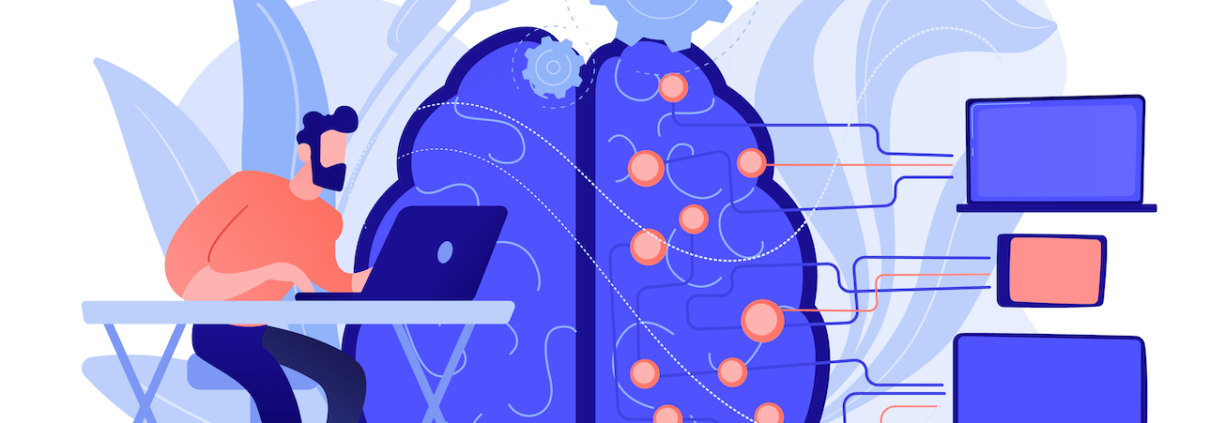AI Strategy: 10 AI Applications You Should Know
A large number of today’s business processes will change through the application of artificial intelligence (AI). Today we only see the tip of the iceberg of the new possibilities. But its use is no longer a vision of the distant future, but is already advanced in many areas and can be used by companies. Managers should therefore already be dealing with how the use of AI will look like in their own company. Which applications are affected and how this can be incorporated into a suitable AI strategy. The following article describes 10 current and concrete AI applications of AI in everyday business. AI applications that can be the first step towards more comprehensive AI use.
Which processes are suitable for AI?
If a business process has at least one of the following 3 characteristics, the use of AI should be examined more closely:
- One and the same process / activity is repeated (repetitive processes)
- A process occurs very frequently (high-volume processes)
- Rule-based processes
Against this background, the use of AI in order processing or data processing is well suited. In many companies, these activities will still be carried out by employees. These tasks are typically repetitive, high-volume, and rule-based processes. This makes the use of artificial intelligence easy to implement and pays for itself within a short time.
10 AI applications with potential
The following 10 AI applications have emerged as of today in corporate use. Most applications can be used regardless of the industry and company size.
(1) AI-powered virtual assistants
AI-powered personal assistants like Amazon Echo, Google Home, and Apple HomePod are examples of virtual assistants that many are already using in their personal lives. However, the systems also unfold their benefits in the corporate sector. Either in use as a management assistant or as additional services for customer assignments. The systems will become increasingly intelligent in the coming years and will be able to perform many daily activities better and better. Against this background, it is already necessary to strategically consider to what extent it makes sense to link your own product world with the usual personal assistants.
(2) AI market research
Various AI-based applications such as IBM’s Watson or Amazon Web Services can conduct extensive research for companies. This also includes competitive analyzes or the creation of detailed reports. In the future, such tools will use companies’ internal data to make amazingly accurate predictions about the success of new products or services.
(3) AI-powered CRM and sales tools
With the help of AI, every step of the sales process can be improved – from generating leads and categorizing them to personalized marketing messages. All major CRM software vendors already integrate AI capabilities into their tools. Today it is no longer a problem to predict customer needs in a timely and targeted manner and to analyze the entire purchasing process in detail. The AI development in this environment is already very advanced and offers companies a good introduction to AI, since data is often available here and the training of the AI system is possible with manageable effort.
(4) AI-generated content for digital marketing campaigns
Virtually every digital marketing activity can be made even better through the use of artificial intelligence. One of the most powerful examples of this is the automated generation of content in text, audio or video form. In the USA and China in particular, sports reports, stock market data or the current weather are created purely by AI. A Chinese news agency has had the news spoken by two virtual employees since the end of 2018 ( see the FAZ report of November 9, 2018 ). For companies, this results in opportunities to have social media posts, press releases and blog articles generated automatically.
(5) AI-powered email marketing tools
When it comes to email marketing, most companies already have a lot of valuable data. This makes the use of artificial intelligence for email marketing campaigns predestined. In doing so, e-mail titles can be analyzed with regard to their opening rate and the optimal length of e-mail texts can be found out. Here, AI is both a measuring instrument and a text generator.
In 2016, Boomerang Respondable was the first AI assistant to help create perfect business emails. The software uses machine learning algorithms trained on hundreds of millions of messages.
(6) AI-based customer service
For many companies, it is a goal to constantly improve customer service. Many service departments have been working with chatbots for quite some time. For example, they can automate interactions with users, support business processes, obtain information or even perform tasks of a personal assistant. But only in recent years have they gained popularity among users and businesses. This is also due to advances in artificial intelligence and the popularity of messaging apps. Many companies today are still using chatbots that are “rules-based” and work without AI, but in the future most of them will be AI-powered and even voice-controlled.
(7) AI-driven accounting
Robot-supported process automation will change the number-heavy business areas in particular. This includes financial management, accounting and controlling. Since most of the day-to-day work of accountants is repetitive and rule-based, most of it can and will be automated by AI. But it will also affect the interfaces to external service providers. Tasks for which tax consultants and auditors are still needed today will then be covered to a large extent.
(8) AI-powered recruitment
One of the areas where the use of AI has been criticized the most is in human resources and recruitment. Although the use of various AI technologies can save time and resources in the hiring process, critics argue that many of them are biased and unethical. Despite the skepticism, however, it is obvious that AI can be very useful in the pre-selection of applicants in several respects. From analyzes of written application documents, social media posts to language evaluations. As people develop in life, current interests and future desires for change must be taken into account equally.
(9) AI-enabled legal activities
As with accounting, many of the activities performed by lawyers are repetitive and rule-based. When reviewing contracts, AI can show very high accuracy rates, and at a fraction of the time it would take a human. The legal platform LawGeex, for example, uses AI to review and revise contracts based on given legal guidelines. Changes in the law can be taken into account promptly and their consequences can be shown. This proves to be particularly advantageous for companies that operate in the international market.
(10) Robotic process automation
Similar to AI, the basic idea of robotic process automation is to identify high-volume, repetitive tasks. An example of this is the processing of orders. Most robotic process automations are currently still rule-based, meaning they do not contain AI. However, it is expected that most software programs of this type will be AI-powered in the future.
Conclusion
It is not a question of whether AI will be used, but when and in what form. The possible uses are already diverse and the applications are increasing day by day. Regardless of whether a company wants to address its customers more precisely, deliver better service or streamline internal processes, the use of AI cannot be avoided. External pressure will also increase to make greater use of the possibilities offered by artificial intelligence.
Managers today have to think intensively about the structured and targeted use of AI in their company. For this purpose, ConWISE offers an AI strategy framework that can be used to easily plan the use of AI for the future.
The ConWISE team will be happy to show you exactly how this works during a non-binding appointment.





